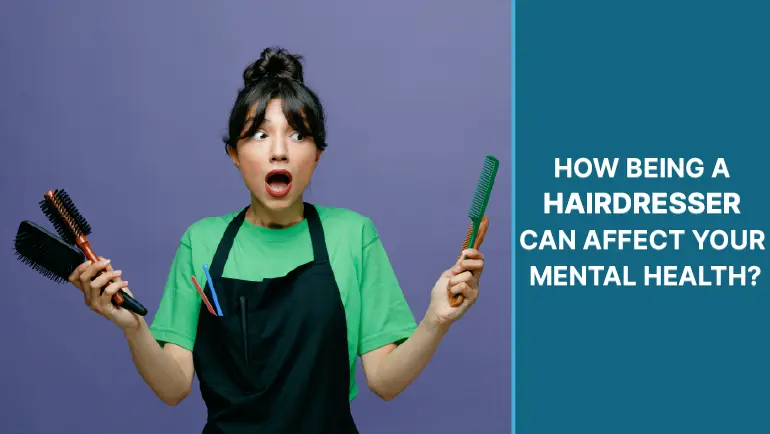Introduction
Hairdressing is nowadays a popular occupation. People, mainly women, are always fascinated by beauty. It is directly related to this purpose. Dealing with demanding clients, long working hours, and high-stress levels can increase anxiety, burnout, and overwhelming feelings. These affect the mental health of hairdressers. Sometimes they feel burnout. They should take care of the well-being of hairdressers are essential.
What Are The Hidden Pressures of Being a Hairdresser?
Hairdressing involves much more than just cutting and styling hair. Behind the scenes, numerous hidden pressures can significantly impact the well-being of these professionals[1].
-
Client Expectations:
Hairdressers face immense pressure to meet clients’ expectations, striving to bring their visions to life while ensuring satisfaction.
-
Time Constraints:
Hairdressers often work under strict time constraints, juggling multiple appointments and trying to deliver impeccable results promptly.
-
Physical Demands:
The job requires prolonged periods of standing, repetitive movements, and exposure to chemicals, leading to physical strain and potential health issues.
-
Emotional Labor:
Hairdressers serve as confidants, listening to clients’ personal stories and problems, which can take an emotional toll over time.
-
Creative Pressure:
Constantly staying updated with the latest trends and techniques is vital to meet clients’ evolving fashion demands and maintaining competitiveness.
-
Work-Life Balance:
Long working hours, including weekends and evenings, can disrupt personal lives and strain relationships, affecting overall well-being.
-
Financial Insecurity:
Many hairdressers work on a commission basis or rent a chair, resulting in fluctuating incomes and economic instability.
-
High-Stress Environment:
The fast-paced salon environment, handling demanding clients or resolving conflicts, can create a stressful atmosphere that impacts mental health.
-
Continuous Learning:
Hairdressers always have to be self-updated, such as spending their valuable time and money on ongoing training, certifications, and skill development to stay relevant.Hairdressers should know the leading causes of burnout from hairdressing. Understanding and addressing these hidden pressures is crucial for supporting their mental health and well-being. They can thrive in their profession, ensuring while maintaining a healthy work-life balance.
How Hairdressing Can Affect Your Mental Health?
Hairdressing, as a profession, can have a significant impact on one’s mental health due to the following factors[2]:
- Client Expectations: The pressure to consistently meet clients’ expectations and create their desired look can lead to stress and self-doubt.
- Emotional Demands: Hairdressers often act as confidants, listening to clients’ personal stories and challenges, which can be emotionally draining and impact their well-being.
- Workload and Time Management: Juggling multiple clients, adhering to tight schedules, and managing the workload can create stress and feeling overwhelmed.
- Self-Criticism and Perfectionism: Hairdressing is a passionate and creative profession. Hairdressers try to do perfectly in their work. Sometimes they self-criticize to maintain high standards. Often they are in fear of making mistakes.
- Physical Strain: Standing for long hours, repetitive motions, and exposure to chemicals can lead to physical fatigue and discomfort, affecting overall well-being.
- Career Pressures: Keeping up with evolving trends, staying competitive, and dealing with job insecurity can contribute to anxiety and stress.
- Work-Life Balance: Hairdressers have irregular working hours, including evenings and weekends. Their work-life balance disrupts due to this reason which hampers their personal lives, also.
Hairdressers are very much creative and focussed, so mental wellbeing plays a vital role. For their good mental wellness, addressing symptoms and challenges is important. Self-care, seeking support from peers or mentors, and setting boundaries help them to overcome the adverse effects of the hairdressing profession.
The Importance of Self-care for Hairdressers
Due to some challenges in their profession, self-care plays a vital role for hairdressers to maintain healthy mental wellness. We discuss some important reasons why self-care is essential for hairdressers[3]:

- Mental and Emotional Well-being: Hairdressers feel stress and burnout in their profession. Engaging in self-care activities such as mindfulness and sometimes seeking therapy cope them manage stress and burnout and take care of their mental and emotional well-being.
- Physical Health: Prioritizing self-care through regular exercise, proper nutrition, and adequate rest can improve physical health, reduce fatigue, and prevent physical strain or discomfort.
- Work-Life Balance: Establishing scheduling time for personal activities and nurturing relationships outside of work can help hairdressers to achieve a healthy work-life balance which reduces the risk of exhaustion and enhance overall satisfaction. More information- Learn To Achieve Work-Life Balance: 5 Effective Tips
- Stress Management: Engaging in stress-relieving practices, such as meditation or hobbies, can help hairdressers cope with the high-pressure environment and demanding clientele, improving resilience and reducing the negative impact of stress.
- Skill Enhancement and Growth: Taking time for professional development, attending workshops or conferences, and staying updated with industry trends can enhance skills, boost confidence, and provide a sense of accomplishment.
- Self-Reflection and Goal Setting: Practicing self-reflection allows hairdressers to identify personal and professional goals, fostering motivation and a sense of purpose.
- Peer Support and Networking: Peer Support and Networking are very much helpful for hairdressers. Due to peer pressure and burnout, they may connect with fellow hairdressers, sharing their experiences and seeking help. Creating a sense of community that provides valuable insight and promotes self-care through collaboration can help them to cope with these issues.
The well-being of their mental wellness they need to prioritize their self-care. When they feel good, they deliver better quality service to their clients. Self-care, help hairdressers to cultivate a healthier and more fulfilling professional life.
Read more about –A Guide on How to Find a Work-Life Balance and Reduce Anxiety
Tips For Dealing With The Challenges of Hairdressing
Hairdressers may face some challenges in their profession. There are some tips that help them to deal with these challenges effectively:

- Set Boundaries: Establish clear boundaries with clients and colleagues to ensure a healthy work-life balance and prevent burnout.
- Practice Self-Care: To reduce stress and promote overall mental well-being, hairdressers need to engage in self-care activities such as exercise, relaxation techniques, and hobbies.
- Seek Support: Sometimes, when they feel burnout, they need to connect with other hairdressers. Joining professional networks or forums to share experiences, seek advice, and gain support from peers who understand the unique challenges of the industry helps them to cope with these issues.
- Develop Time Management Skills: Improve time management by scheduling appointments effectively, allocating time for breaks, and organizing tasks to minimize stress and maintain a smooth workflow.
- Continuous Learning: To enhance their skills and stay competitive, they should update themselves with the latest trends, techniques, and industry developments through workshops, training programs, and online resources.
- Communicate Effectively: Develop strong communication skills to understand clients’ needs, manage expectations, and address any concerns or conflicts that may arise[4].
- Take Care of Physical Health: Prioritize proper ergonomics, take regular breaks to rest and stretch, and follow safety protocols to prevent physical strain or injuries.
- Practice Stress Management: Implement techniques such as deep breathing exercises, meditation, or engaging in hobbies outside of work to reduce stress levels and promote relaxation.
- Develop a Supportive Work Environment: Foster a positive and supportive work environment by promoting teamwork, open communication, and offering support to colleagues when needed.
- Seek Professional Help if Needed: If experiencing persistent challenges or difficulties, consider seeking professional help from therapists or counselors who specialize in addressing the mental health concerns of individuals in the hairdressing profession.
Hairdressers’ mental well-being is important for their carrier and success. So, It is important to find strategies to deal with their issues.
Conclusion
Hairdressing is creative work. Due to clients’ demands, achieving success, they face challenges that significantly impact their mental health. Engaging in Self-care, seeking support, and implementing strategies to address these challenges are very much useful for hairdressers.
Read more- Finding Help and Healing through online Counselling
United We Care, a mental wellness platform, provides valuable resources and support, offering guidance and assistance in navigating the complexities of the professions while promoting mental well-being.
REFERENCES
[1]J. Oh, “Is being a hairdresser stressful? How to avoid becoming burned out,” Japan Scissors, 01-Oct-2021. [Online]. Available: https://www.japanscissors.com.au/blogs/hair-industry/hairdresser-stressful-how-to-avoid-becoming-burned-out. [Accessed: 13-Jun-2023].
[2]L. A. Morgan, “Pros & cons of cosmetology,” Work – Chron.com, 26-Sep-2012. [Online]. Available: https://work.chron.com/pros-cons-cosmetology-10495.html. [Accessed: 13-Jun-2023].
[3]“Seven ways to strike a better work-life balance as a hairdresser,” HJI, 18-May-2023. [Online]. Available: https://www.hji.co.uk/mental-health-awareness/work-life-balance-hairdresser/. [Accessed: 13-Jun-2023].
[4]“The top disadvantages of working as a hairdresser,” Germantown News & Shelby-Sun Times, 31-Aug-2021. [Online]. Available: https://shelby-news.com/the-top-disadvantages-of-working-as-a-hairdresser/. [Accessed: 13-Jun-2023].





